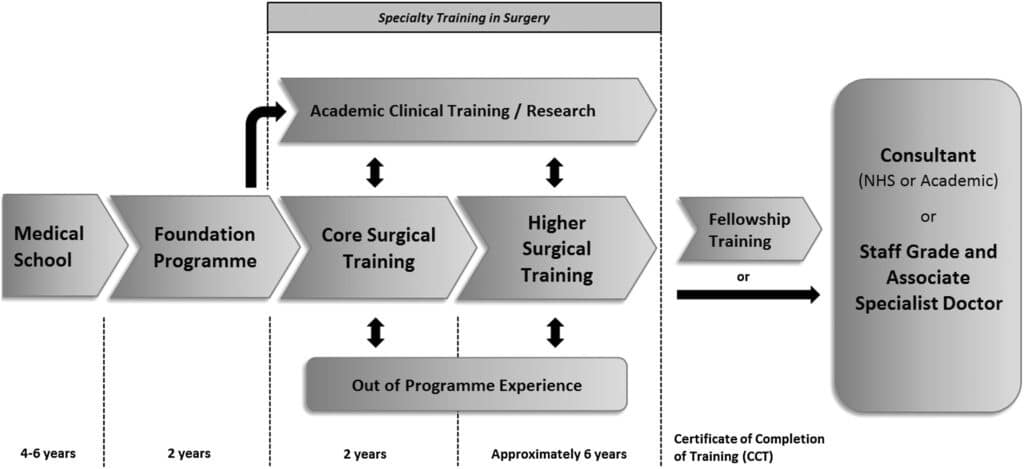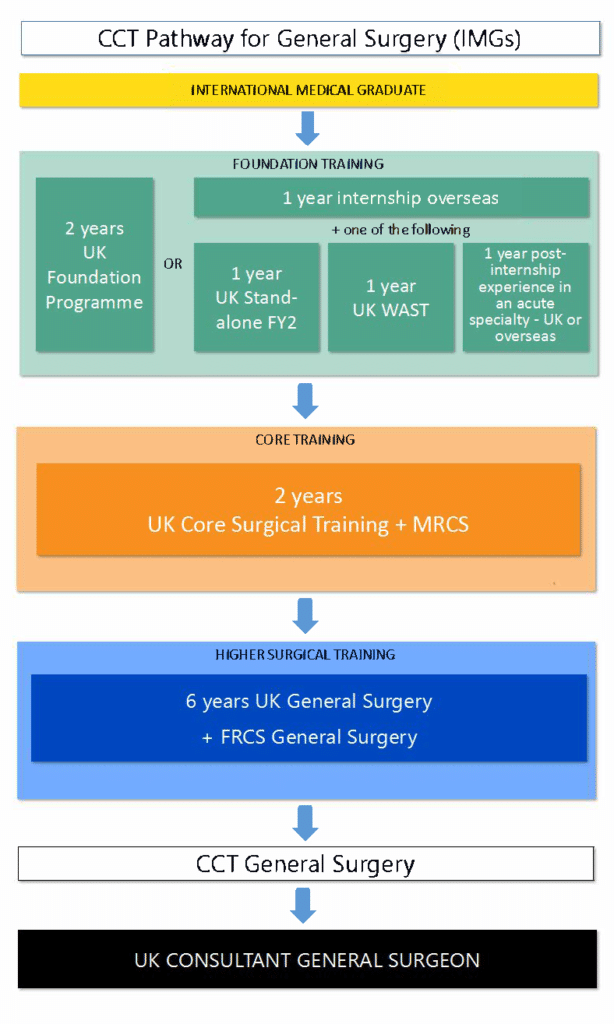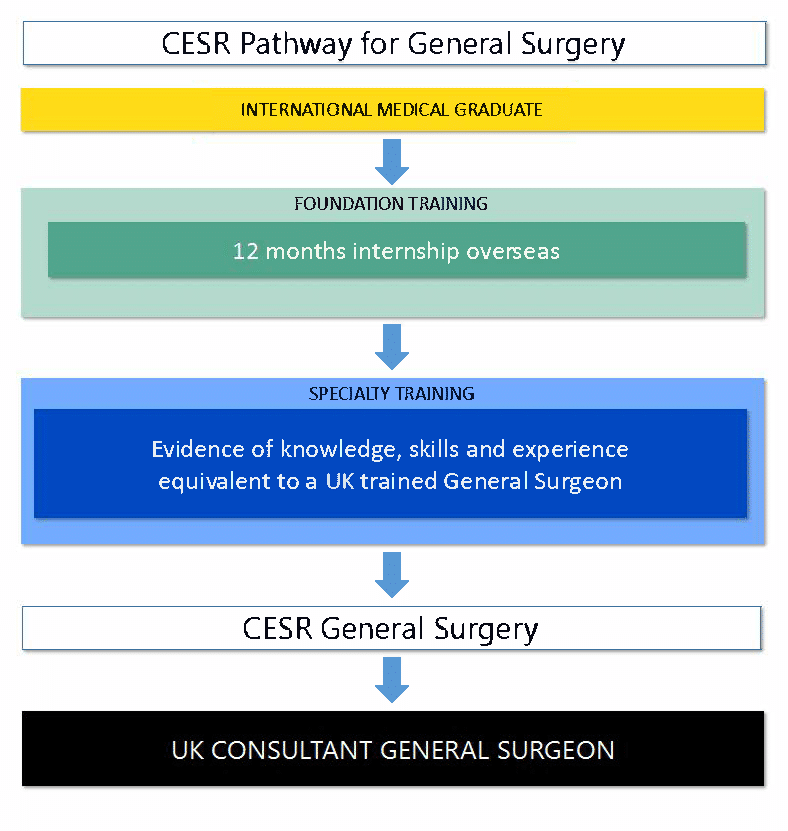General Surgery in the United Kingdom without PLAB, General Surgeon in the United Kingdom, General Surgery residency training UK, MRCS UK exam format and syllabus, FRCS UK exam format and syllabus, General Surgeon program UK,
General Surgery is an exciting field and role of practitioner varied widely. General surgeons are doctors who specialize in surgical procedures. Surgery is any procedure that alters body tissues to diagnose or treat a medical condition. General Surgeons in the United Kingdom usually subspecialise in any specific body are but they must have sound knowledge of general skills as they are also required to participate in the emergency surgical processes. General Surgery in the United Kingdom is amongst the most demanding surgical specialities. It is a highly competitive branch, luckily competition levels are lower when compared to other surgical specialities.
General surgery is a surgical specialty that focuses on abdominal contents including the oesophagus, stomach, small intestine, large intestine, liver, pancreas, gallbladder, appendix and bile ducts, and often the thyroid gland. They also deal with diseases involving the skin, breast, soft tissue, trauma, Peripheral artery disease and hernias and perform endoscopic procedures such as gastroscopy and colonoscopy.
Training Structure of General Surgery in the United Kingdom
General Surgery Residency in the United Kingdom is an eight-year-long training program. Training is classified as uncoupled training because of the involvement of two application processes.
- Core Surgery (2 years), followed by
- General Surgery (6 years)

CT1 & CT2 or ST1 & ST2 are training years for Core Surgical Training. Core Surgical Training (CST) provides hands on training in the hospital in the range of clinical specialities. After CST one has to complete Membership of Royal College of Surgeons (MRCS UK) examination.
ST3 specialty surgical training (ST3-8) lasts six years. After successful completion of your core surgical training, trainee needs to apply for next phase of training (ST3). During higher training you must take examinations leading to fellowship of the Royal College of Surgeons (FRCS).
At ST3 level it is mandatory to have at least 24 months’ experience in surgery (not including foundation modules). At least 12 months of this experience needs to be in elective general surgery and at least 12 months in emergency general surgery. This experience can be gained in any country.
Become a Consultant General Surgeon in the United Kingdom
If you want to become a recognized UK Consultant General Surgeon, you need to be on the GMC Specialist Registrar. After this you can apply for Permanent Consultants post in the NHS.
You can enter the specialist register via 3 possible routes
- CCT
- CESR-CP
- CESR
CCT Route
This route of surgical training comprises of two years of Core Surgical Training (CST) followed by 6 years of UK General Surgery higher surgical training programme. After successful completion of 8 years of training in surgery, CCT will be awarded.

CCT Route is the most recommended routes for fresh graduates, doctors who haven’t completed Post graduate surgical training or considered over qualified for the training.
Its worth noting her that if an applicant has more than 18 months of experience in any surgical speciality any where in the world, will make you over qualified for Core Medical Training and cannot pursue CCT.
CESR-CP route
This is the best route for International Medical Graduates(IMG) who have some experience and training in surgery. Applicant who are overqualified for CCT can go for this route.

If an applicant doesn’t complete Core Surgical Training and enters UK General Surgery higher surgical training, then this is the Certificate of Eligibility for Specialist Registration Combined Programme (CESR-CP) route.
The entry point in this route is ST3 and one is required to complete 6 years of UK General Surgery Training Program.
As per the latest rules of GMC, doctors who are on CESR-CP route still need to complete minimum 5 years of General Surgery Training to be eligible for CCT. CESR will be awarded if minimum 5 years training is not completed.
CESR
CESR stands for Certificate of Eligibility for Specialist Registration
This is the best route for doctors who have already completed their General Surgery Training and holds some experience in the speciality as a consultant. Trainees who have completed their residency and don’t want to repeat their training can also go for this option.

Trainee needs to complete official 6 year General Surgery Residency program. In case any part of the training is incomplete you can still be considered as a Consultant General Surgeon by providing documentary evidence providing proof that you have the equivalent experience and training. This documentary proof can be from overseas, from the UK or a combination of both.
Exams to become Recognised General Surgeon in the UK
MRCS and FRCS are the two official exams of UK General Surgery Training
Membership of Royal College of Surgeons (MRCS) Exam
This Exam has two parts
PART A: Written Test
- Paper 1: applied basic sciences
- Paper 2: principles of surgery in general
PART B: Practical Exam
These stations will examine the following broad content areas:
- Applied knowledge: consisting of anatomy, surgical pathology, applied surgical science and critical care
- Applied skills: consisting of communication skills in giving and receiving information, history taking and clinical & procedural skills
https://www.rcseng.ac.uk/education-and-exams/exams/search/intercollegiate-mrcs/
Doctors wishing to apply for ST3 must clear both the exams
Fellowship of Royal College of Surgeons (FRCS) Exam
This is the exit exam of General Surgery Training. It also has 2 parts, a written test (Section 1), and a practical/oral exam (Section 2). General Surgery trainees must clear both parts by the end of ST8. Most trainees also attempts these exams after completion of ST6.
FAQ
How can I pursue Surgery in the UK without PLAB?
Yes, you can pursue a General Surgery residency without PLAB in the UK. You can join surgery training without PLAB via the ISTP route sponsored by the Royal College of Surgeons.

